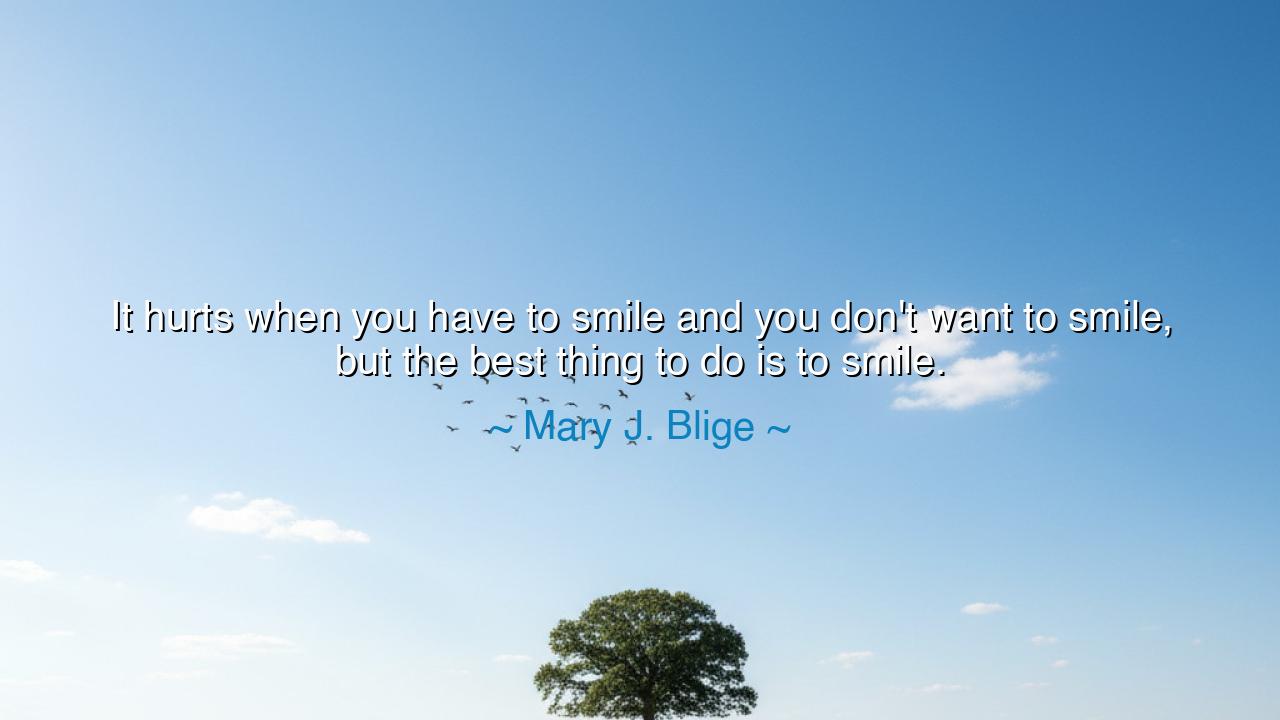
It hurts when you have to smile and you don't want to smile, but
It hurts when you have to smile and you don't want to smile, but the best thing to do is to smile.






Hear now the wisdom carried in the voice of Mary J. Blige: “It hurts when you have to smile and you don’t want to smile, but the best thing to do is to smile.” These words are born not from ease, but from the furnace of suffering. They tell us of the weight upon the heart, when the soul longs to weep and yet must present the mask of joy. This is no hollow command to deny pain, but a recognition of the human struggle: that life often demands endurance, and that endurance sometimes takes the form of a smile that hides the wound.
The ancients spoke of such duality. They knew the mask of strength, worn by warriors who marched into battle though fear clawed at their insides. To smile when one does not wish to smile is not falsehood, but courage. It is the declaration that though grief dwells within, it shall not master the outward life. It is the choosing of light in the face of darkness, the lifting of one’s countenance so that others may not stumble, even when one’s own heart feels broken. Thus, the smile becomes not a lie, but a shield, guarding both the bearer and those around them.
Consider the tale of Abraham Lincoln, who bore the weight of a divided nation upon his shoulders. Known for his melancholy, often shadowed by sorrow, he yet carried himself with humor, gentle words, and the kind smile of a weary but determined man. Behind that smile lay oceans of pain—the grief of lost children, the torment of war, the loneliness of leadership. And yet, he chose to smile, because his people needed to see not despair but hope. In this we see the teaching of Mary J. Blige: though it hurts to smile, sometimes it is the best thing one can do—for oneself, and for the world.
The meaning of the quote also speaks to the healing power of discipline. The ancients said, “Act as if, and soon you will become.” When the lips curve into a smile, even against the will, the heart slowly follows. The act itself summons light into the darkness of the soul. Science, too, has confirmed this ancient truth: the body that smiles, even in sorrow, calls forth endorphins, easing the burden within. Thus, what begins as an act of pain may transform into a balm, slowly softening the wound of the heart.
Yet this teaching does not deny the reality of suffering. To admit that “it hurts” is already to confess that life is not always kind, and that strength does not mean the absence of pain. Indeed, the strength lies in carrying pain with dignity, not in pretending it does not exist. To smile when it burns inside is to say, “I will not let sorrow strip me of grace.” It is a quiet act of defiance, a heroism hidden in plain sight, known only to the one who bears it.
What lesson, then, must the reader take? That the smile is not always for pleasure—it is sometimes for survival. It is the choice to hold onto dignity in moments when the world would see you broken. It is the armor of the soul, forged in resilience. And though it may feel false in the moment, it can ignite true strength over time. The path of life will demand such moments of inner warfare, when the spirit must wear brightness even as it walks through storm.
So let each person practice this ancient art. When sorrow comes, do not despise your tears, for they, too, are sacred. But when the moment calls for courage—when your children look to you, when your companions need your steadiness, when your own soul teeters at the edge of despair—then remember these words: “The best thing to do is to smile.” Stand tall, lift your face, and let the light return, if only by the discipline of your will. In time, that smile may no longer be a burden, but a banner of triumph, proclaiming to the world: I was hurt, yet I endured.
Thus, O sons and daughters of tomorrow, receive this teaching as sacred inheritance. The smile, even when it hurts, is the sign of an unbroken soul. Wear it not as denial, but as strength. Practice gratitude in secret, let kindness dwell on your tongue, and lift your face to the sun—even when the clouds are heavy. For in doing so, you shape not only your destiny, but the destinies of all who walk beside you. Smile, though it hurts—for it is the way of the strong, and the song of the eternal spirit.






AAdministratorAdministrator
Welcome, honored guests. Please leave a comment, we will respond soon